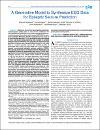A Generative Model to Synthesize EEG Data for Epileptic Seizure Prediction
| المؤلف | Rasheed, Khansa |
| المؤلف | Qadir, Junaid |
| المؤلف | O'Brien, Terence J. |
| المؤلف | Kuhlmann, Levin |
| المؤلف | Razi, Adeel |
| تاريخ الإتاحة | 2023-07-13T05:40:52Z |
| تاريخ النشر | 2021 |
| اسم المنشور | IEEE Transactions on Neural Systems and Rehabilitation Engineering |
| المصدر | Scopus |
| الرقم المعياري الدولي للكتاب | 15344320 |
| الملخص | Objective: Scarcity of good quality electroencephalography (EEG) data is one of the roadblocks for accurate seizure prediction. This work proposes a deep convolutional generative adversarial network (DCGAN) to generate synthetic EEG data. Another objective of our study is to use transfer-learning (TL) for evaluating the performance of four well-known deep-learning (DL) models to predict epileptic seizure. Methods: We proposed an algorithm that generate synthetic data using DCGAN trained on real EEG data in a patient-specific manner. We validate quality of generated data using one-class SVM and a new proposal namely convolutional epileptic seizure predictor (CESP). We evaluate performance of VGG16, VGG19, ResNet50, and Inceptionv3 trained on augmented data using TL with average time of 10 min between true prediction and seizure onset samples. Results: The CESP model achieves sensitivity of 78.11% and 88.21%, and false prediction rate of 0.27/h and 0.14/h for training on synthesized and testing on real Epilepsyecosystem and CHB-MIT datasets, respectively. Using TL and augmented data, Inceptionv3 achieved highest accuracy with sensitivity of 90.03% and 0.03 FPR/h. With the proposed data augmentation method prediction results of CESP model and Inceptionv3 increased by 4-5% as compared to state-of-the-art augmentation techniques. Conclusion: The performance of CESP shows that synthetic data acquired association between features and labels very well and by using the augmented data CESP predicted better than chance level for both datasets. Significance: The proposed DCGAN can be used to generate synthetic data to increase the prediction performance and to overcome good quality data scarcity issue. 2001-2011 IEEE. |
| راعي المشروع | The work of Adeel Razi was supported in part by the Australian Research Council under Grant DE170100128 and Grant DP200100757, in part by the Australian National Health and Medical Research Council Investigator Grant under Grant 1194910, and in part by the Wellcome Centre for Human Neuroimaging by Wellcome under Grant 203147/Z/16/Z. |
| اللغة | en |
| الناشر | Institute of Electrical and Electronics Engineers Inc. |
| الموضوع | adversarial networks deep learning EEG Epileptic seizure machine learning transfer learning |
| النوع | Article |
| الصفحات | 2322-2332 |
| رقم المجلد | 29 |
الملفات في هذه التسجيلة
هذه التسجيلة تظهر في المجموعات التالية
-
علوم وهندسة الحاسب [2427 items ]


